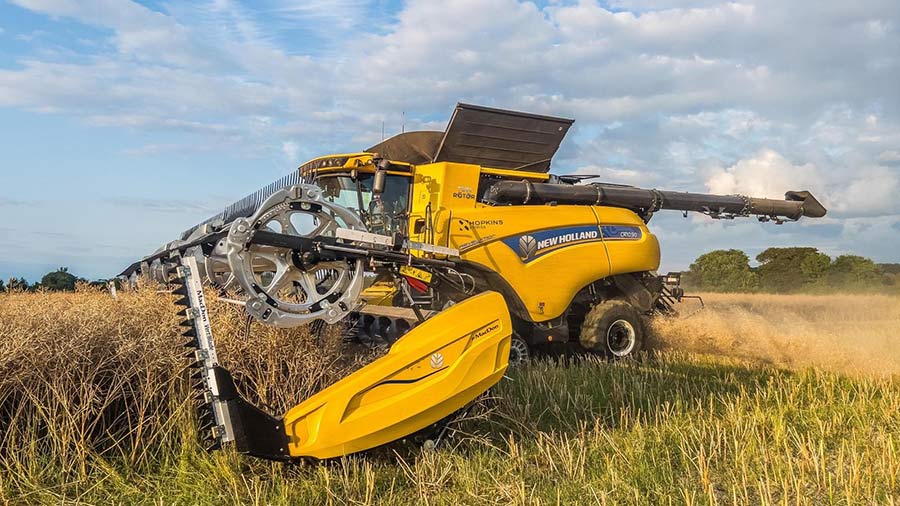Harvest Highlights: Rain frustrations and disappointing yields
 © Tim Scrivener
© Tim Scrivener Over the past couple days combines have been re-emerging in the South, and first impressions are starting to be made on the harvest 2023 to come.
Essex
Harvest began on Monday (17 July) afternoon for Carl Juhl, farm manager at Little Farms in Saffron Walden, with Craft winter barley in at 16.7% moisture. Although harvest continued on Tuesday at 14.7% moisture, rain stopped play after catchy local showers, with only 50ha complete out of 200ha.
“It’s a slightly earlier start than average, but not as early as last year by a long way,” says Carl.
See also: Arable farmers outline their crop rotation tweaks for 2023-24
Winter barley yielded 8t/ha, at 67.5kg/hl specific weight, and an average nitrogen of 1.6%.
Carl has a total of 1,150ha to combine this year, including 500ha winter wheat of varieties Costello, Skyfall, Graham, Dawsum and Extase.
Hampshire
In Hampshire, the weather has held at DJ & ME Saunders and Sons near Winchester.
“The weather has been catchy, but we’re quite lucky that it’s fallen at just the right time not to hold us up too much,” says Neil Saunders.
He has completed both his 43ha of Tardis winter feed barley and 32ha of Matrix oilseed rape.
Tardis yields were low compared to previous years, specific weights were between 60-64kg/hl and moisture, 13.5%-17%.
Having also harvested oilseed rape – at 7.5-9.5% moisture, next on the agenda will be Isabel spring oats, Laureate spring barley, then Graham, Dawsum, Typhoon, and Champion winter wheat.
“There has been a lot of septoria pressure in the wheat with the wet March we had, even in quite resistant varieties,” says Neil.
Avon
Looking West, Alvis Contracting made a start on Wednesday (19 July) with Cassia winter barley at 17% moisture content, and yields are not anticipated to be high this year.
“The wet spring has led many crops to be lazy rooters; last year was quite dry and the plants put their roots further down into the ground,” says Daniel Harding of Alvis.
“The grains look pinched up, so I don’t imagine the yields are going to be great.”
Alvis has a total of 728ha to combine at Lye Cross Farm plus contract farms, including winter wheat varieties Graham, Zyatt, and Extase which are dying off earlier than usual.
“The headlands are patchy on wetter ground which is probably going to take the yields down,” says Daniel.
They plan to get the combines into oilseed rape on Friday (21 July).
Vespa winter beans have matured early due to the dry weather and harvesting is predicted to begin in the third week of August, a week earlier than expected.
South Somerset
Further south on the Hopkins Estate, near Wincanton, harvest started on Tuesday (18 July) with 30.3ha of Aurelia oilseed rape cut at a moisture content of 9-10%.
Next was 132ha of feed winter barley – Hawking – at 12% moisture content. Specific weight was 68kg/hl and it yielded 7.8t/ha.
“We need to get the straw baled up by Friday before rain at the weekend,” says Toby Hopkins.
“Harvest is a bit late, we started on 12 July last year,” he adds.
The Hopkins Estate has around 1,821ha of cereal crops to combine this year, including winter wheat varieties Champion, Graham, Dawsum, and Skyfall.
Cornwall
At Tregirls Farm near Padstow, Charlie Watson-Smyth started combining his 100ha of Cassia winter barley on Wednesday (19 July) at a moisture content below 16%, and says it is disappointing so far.
“We are late [starting harvest], it’s usually the first few days of July we start,” says Charlie.
“When we think we’re going to be getting started, it’s raining.”
After enduring weather spells ranging from very dry to very wet since October and coping with high fertiliser and spray prices, it has been a difficult year for both Charlie and neighbouring farms.

